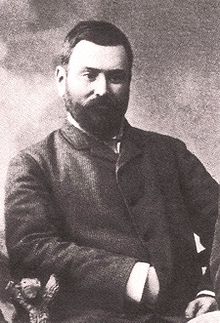Joaquim Pedro de Oliveira Martins
You can help expand this article with text translated from the corresponding article in Portuguese. (November 2010) Click [show] for important translation instructions.
|
Joaquim Pedro de Oliveira Martins | |
|---|---|
 | |
| Born | 30 April 1845 |
| Died | 24 August 1894 (aged 49) Lisbon, Portugal |
| Nationality | Portuguese |
| Occupation(s) | Politician, social cientist |
Joaquim Pedro de Oliveira Martins (30 April 1845 – 24 August 1894) was a
Martins was born and died in Lisbon. He was the son of Francisco Cândido Gonçalves Martins (born Lisbon, Mercês, bap. 16 June 1812) and wife Maria Henriqueta de Morais Gomes de Oliveira (born Setúbal, São Lourenço (Vila Nogueira de Azeitão), bap. 26 August 1817).
Oliveira Martins is considered one of the key figures in the contemporary history of Portugal. His works influenced many generations of writers, such as António Sérgio (1883–1969), António Sardinha (1887–1925) or the philosopher Eduardo Lourenço (1923–2020).
He married on 10 March 1865 Vitória Mascarenhas Barbosa, without issue. His great-nephew is former
Life
An orphan, Oliveira Martins did not have an easy adolescence; he did not finish high school, which would lead him to Polytechnic School to be a military engineer. He was a businessman between 1858 and 1870, but because his firm went bankrupt, he later became manager of a mine in

In 1880 he was elected president of the Sociedade de Geografia Comercial of Porto and, four years later, manager of the Museum of Industry of Commerce in the same city. Later, he was also manager of the Company of Mozambique and member of the executive commission of the Portuguese Industrial Exhibition.
Oliveira Martins became a deputy elected by
Main works
Oliveira Martins worked for the major literary, scientific, political and socialist Portuguese journals. His vast work began with the romance
Martins' historiography
According to historian Sérgio Campos Matos, in Oliveira Martins'
Oliveira Martins was greatly influenced by authors like the German historian Theodor Mommsen, namely the importance given to the hero as the man who better incarnates the nation's soul, the collective psychology of the nation in a given historical moment, corresponding to its demands and ambitions. In Martins' last works the individual's function in history grows, as a sign of his skepticism towards an immediate national regeneration.[6]
References
Bibliography
- MATOS, Sérgio Campos (1992). "Na génese da teoria do herói em Oliveira Martins" in Estudos de homenagem a Jorge Borges de Macedo. Lisboa: INIC.
- MAURÍCIO, Carlos Maurício (2000). “O falso Portugal de Oliveira Martins” in Ler História, nº38, pp. 57–86.
- J. P. de Oliveira Martins, Portugal nos Mares: Ensaios de Critica, Historia e Geographia, Lisboa, Bertrand, 1889 (repr. Parceria Antonio Maria Pereira, 1924).
External links
- Prestage, Edgar (1911). . In Chisholm, Hugh (ed.). Encyclopædia Britannica. Vol. 20 (11th ed.). Cambridge University Press. p. 87.
- Works by Joaquim Pedro de Oliveira Martins at Project Gutenberg
- Works by or about Joaquim Pedro de Oliveira Martins at Internet Archive

